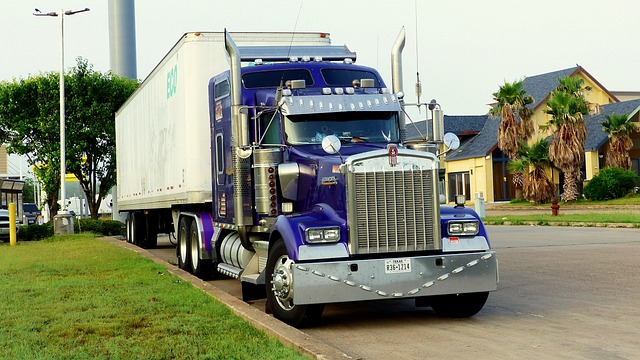Maintaining accurate commercial truck ownership records is vital for fleet managers and owners to ensure safety, regulatory compliance, and operational efficiency. These records help identify risks, navigate recalls, and enhance transparency within the trucking industry by adhering to federal and state regulations. Accurate record-keeping enables informed decisions on vehicle safety, prevents operational hazards, and simplifies liability determination. Digitizing ownership logs offers enhanced accessibility, minimizes data loss risks, and facilitates real-time updates and verification using centralized databases or specialized fleet management software.
Maintaining comprehensive and accurate Commercial Truck Ownership Records is a cornerstone of responsible fleet management. These records serve as a detailed chronicle, offering insights into each vehicle’s journey from acquisition to disposal. By meticulously documenting ownership history, including previous owners, title transfers, and any legal liens, fleet managers and truck owners can significantly enhance operational efficiency and ensure strict compliance with regulatory standards. Recent industry events, such as widespread recalls due to critical safety issues, highlight the vital role of diligent ownership record-keeping in identifying and mitigating potential hazards.
- Understanding the Importance of Commercial Truck Records
- Legal and Compliance Aspects of Ownership Documentation
- How Accurate Records Prevent Operational Hazards
- Efficient Tracking: From Purchase to Disposal
- Best Practices for Maintaining Digital Ownership Logs
Understanding the Importance of Commercial Truck Records

Maintaining accurate commercial truck ownership records is akin to having a detailed map, guiding fleet managers and owners through the complex landscape of vehicle history. These records serve as a robust tool for identifying potential risks and ensuring compliance with regulatory standards. In today’s interconnected world, where recalls and safety issues can spread rapidly, having comprehensive data on hand allows stakeholders to navigate these challenges efficiently.
For instance, when a major recall is announced, such as the recent steering failure affecting heavy-duty trucks, meticulous ownership records enable swift identification of affected vehicles. This proactive measure facilitates targeted actions, ensuring that owners can address safety concerns promptly and minimize operational disruptions. By keeping track of ownership history, previous maintenance records, and any legal intricacies, fleet managers empower themselves to make informed decisions, ultimately enhancing the overall efficiency and safety of their trucking operations.
Legal and Compliance Aspects of Ownership Documentation

Maintaining accurate ownership documentation is not just a best practice, it’s a legal necessity. Fleet managers and truck owners must adhere to various federal and state regulations that govern vehicle registration, title transfer, and reporting. Failure to keep meticulous records can result in hefty fines, license suspensions, or even criminal charges. Furthermore, these records serve as critical evidence during audits, litigation, or in the event of a dispute over ownership.
Compliance with these legal requirements goes beyond individual states. Since commercial trucks often operate across state lines, owners must be familiar with interstate regulations and uniform laws governing vehicle titles. This ensures that every transaction is legally sound and protects all parties involved, fostering trust and transparency throughout the industry.
How Accurate Records Prevent Operational Hazards

Accurate ownership records serve as a powerful tool to prevent operational hazards by providing a clear and comprehensive view of each vehicle’s history. Fleet managers can quickly trace the lineage of every truck, identifying when and where it was purchased, sold, or traded. This level of detail enables them to uncover potential red flags, such as vehicles with hidden mechanical issues or those that have been involved in accidents. By knowing the previous ownership and maintenance records, managers can make informed decisions about vehicle safety, reliability, and overall operational efficiency.
Moreover, meticulous record-keeping ensures compliance with regulatory bodies’ requirements. In the event of a recall or safety inspection, having accurate documents readily available streamlines the process, allowing for swift identification of affected vehicles and their owners. This proactive approach minimizes disruptions and potential risks associated with unsafely operated vehicles, ultimately contributing to a safer and more responsible fleet management practice.
Efficient Tracking: From Purchase to Disposal

Maintaining accurate records from the moment a truck is purchased until its disposal is a cornerstone of efficient fleet management. This continuous tracking allows for a comprehensive view of each vehicle’s history, enabling managers to quickly identify patterns and potential issues. For instance, if a series of similar maintenance or repair records appear, it may indicate recurring problems that need addressing.
Moreover, up-to-date ownership records facilitate the identification of liability in case of accidents or legal issues. With clear documentation, fleet managers can swiftly determine responsibility, especially during recalls like the recent steering failure incident affecting heavy trucks. This proactive approach to record-keeping not only ensures compliance but also fosters a culture of transparency and accountability within the fleet operation.
Best Practices for Maintaining Digital Ownership Logs

Maintaining digital ownership logs offers several advantages, such as improved accessibility and reduced risk of data loss compared to paper records. Fleet managers should adopt a systematic approach to digitize this process, ensuring all transactions are logged accurately and securely. A robust digital system allows for real-time updates, enabling quick verification of ownership details.
Implementing a centralized database or utilizing specialized fleet management software is recommended. These tools facilitate efficient data organization, search functionality, and the ability to generate reports. Regular backups and access controls should be in place to safeguard this critical information from unauthorized access or potential cyber threats.
Maintaining accurate Commercial Truck Ownership Records is not merely a best practice; it’s a non-negotiable requirement in today’s stringent regulatory environment. As demonstrated by recent industry events, meticulous record-keeping enables fleet managers to proactively identify and address potential safety hazards, ensuring compliance and minimizing operational disruptions. By adopting digital logging systems and implementing best practices outlined in this article, stakeholders can leverage their ownership records as a powerful tool for enhancing overall fleet efficiency and public safety.



